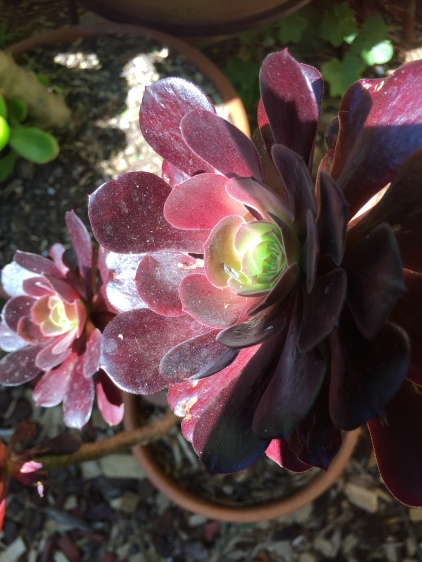
A Black rose. Aeonium arboretum (With thanks to Peter Hannemann)
Dulce et Decorum Est
(a reference to the Latin phrase Dulce et decorum est pro patria mori, which means “It is sweet and proper to die for one’s country” )
BY WILFRED OWEN
Bent double, like old beggars under sacks,
Knock-kneed, coughing like hags, we cursed through sludge,
Till on the haunting flares we turned our backs,
And towards our distant rest began to trudge.
Men marched asleep. Many had lost their boots,
But limped on, blood-shod. All went lame; all blind;
Drunk with fatigue; deaf even to the hoots
Of gas-shells dropping softly behind.
Gas! GAS! Quick, boys!—An ecstasy of fumbling
Fitting the clumsy helmets just in time,
But someone still was yelling out and stumbling
And flound’ring like a man in fire or lime.—
Dim through the misty panes and thick green light,
As under a green sea, I saw him drowning.
In all my dreams before my helpless sight,
He plunges at me, guttering, choking, drowning.
If in some smothering dreams, you too could pace
Behind the wagon that we flung him in,
And watch the white eyes writhing in his face,
His hanging face, like a devil’s sick of sin;
If you could hear, at every jolt, the blood
Come gargling from the froth-corrupted lungs,
Obscene as cancer, bitter as the cud
Of vile, incurable sores on innocent tongues,—
My friend, you would not tell with such high zest
To children ardent for some desperate glory,
The old Lie: Dulce et decorum est
Pro patria mori.
November 11, 2018 at 6:51 am |
Reblogged this on lifecameos and commented:
Wilfred Owen’s WW I poem reminds us of the realities of war, and why we should do all we can to end all wars, hard though it may be.
LikeLiked by 3 people
November 11, 2018 at 8:18 pm |
Some still think wars solve conflicts, but they don’t.
LikeLiked by 4 people
November 11, 2018 at 6:51 am |
Reblogged this on Lifecameos. Very timely.
LikeLiked by 1 person
November 11, 2018 at 8:19 pm |
Thank you so much. It made my day.
LikeLiked by 1 person
November 11, 2018 at 7:02 am |
This is my favourite war poem. It’s part of the National curriculum here. It’s quite effective if read as a snarling punk poet might do. Highlights the despair Owen felt. Wholly suitable on this day of days.
LikeLiked by 2 people
November 11, 2018 at 8:22 pm |
It is a great poem. I came upon it by chance, reading another blog.
My parents did not want us to talk about wars.
LikeLiked by 1 person
November 11, 2018 at 12:25 pm |
LikeLiked by 3 people
November 11, 2018 at 8:23 pm |
Thank you, GP Cox.
LikeLiked by 1 person
November 11, 2018 at 3:35 pm |
There’s a big ongoing debate in the U.S. over the removal of monuments and statues. This is a poem that should be carved in stone as a reminder. I never realized Owen survived until just one week before the peace, and his mother got the telegram on Armistice Day.
LikeLiked by 3 people
November 11, 2018 at 8:31 pm |
Monuments to war are everywhere in towns or villages with names inscribed of those fallen. I sometimes think there is more emphasis on war than on peace.
I do like the black rose picture. Helvi tells me she bought it some years ago. It survived and must have avoided the frost.
LikeLiked by 2 people
November 11, 2018 at 9:01 pm |
This brings tears. Thank you for sharing this today, Gerard. Timely, poignant, and so important.
(((HUGS)))
LikeLiked by 2 people
November 11, 2018 at 10:07 pm |
My dad, during the last year of the war and occupation of Holland, walked with a wheelbarrow all the way from bombed-out Rotterdam to the North east of Holland, a potato growing province.
He would try and get potatoes for his starving family. On his walk back he met so many hungry people he could not but share his bounty. He did arrive with still a few potatoes left.
We survived. A miracle.
LikeLiked by 3 people
November 12, 2018 at 8:11 am
A miracle indeed. And your Dad sounds like he was a wonderful dad. His story you share here makes me cry out of sadness that he had to travel so far for food for his family, but, also, out of joy for his generosity with others.
LikeLiked by 2 people